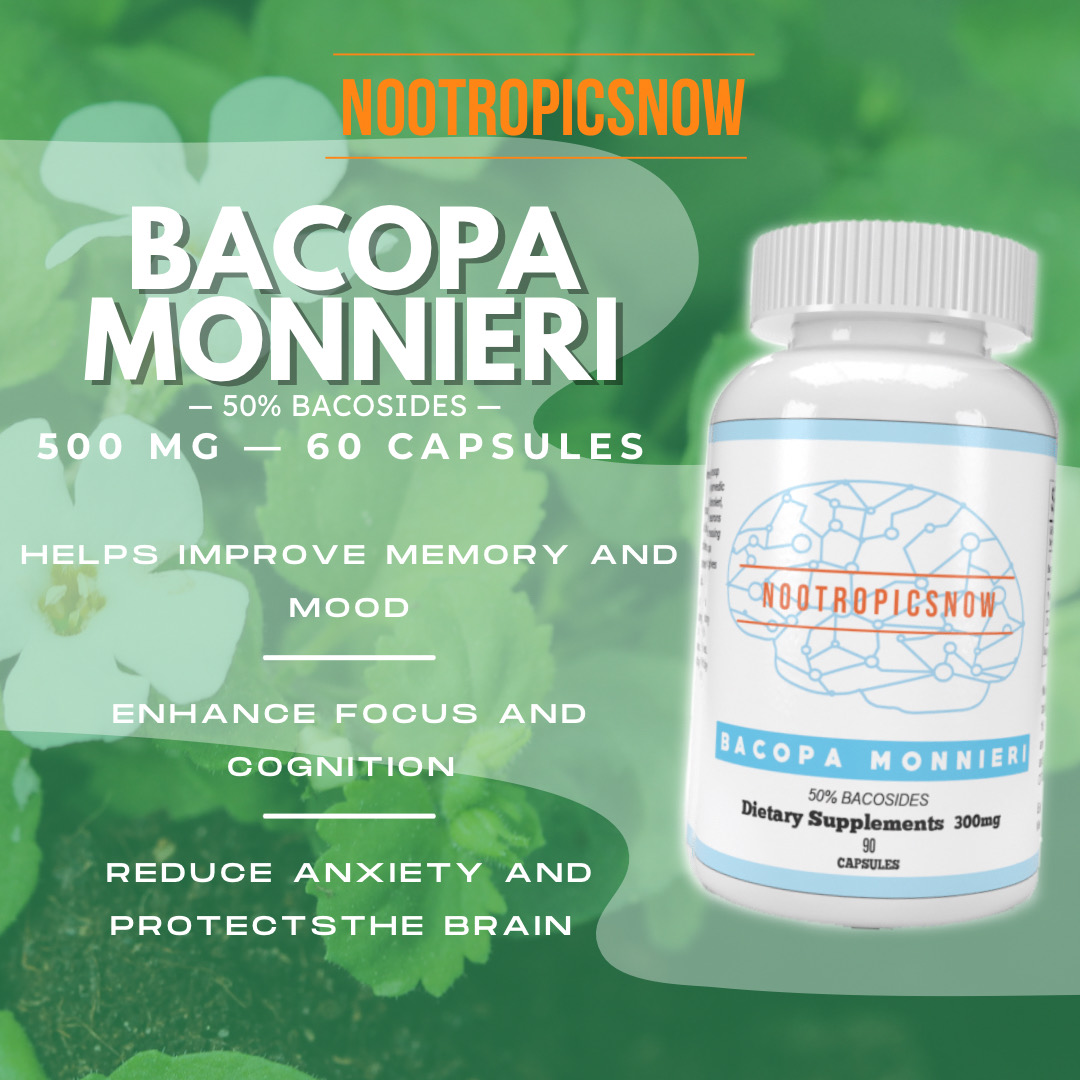Ashwagandha: Nootropic Benefits & Uses

`markdown
Nootropics: Ashwagandha – A Comprehensive Guide
Ashwagandha, also known as Withania somnifera, is an ancient herb deeply rooted in Ayurvedic medicine. People have utilized this powerful adaptogen for centuries to improve overall health and well-being. It’s renowned for its potential to enhance cognitive function, reduce stress, and boost energy levels. This comprehensive guide explores ashwagandha’s nootropic benefits, optimal dosages, potential side effects, and how it compares to other cognitive enhancers. Let’s delve into the world of ashwagandha and its exciting potential as a natural nootropic.
What is Ashwagandha?

Ashwagandha is an adaptogenic herb, meaning it helps the body adapt to stress, whether physical, emotional, or environmental. It has a rich history in traditional medicine, mainly used for rejuvenating the body and mind. Therefore, you might consider Ashwagandha if you’re looking for a natural way to improve your cognitive function.

View Product
The plant itself is a small shrub with yellow flowers, native to India and Southeast Asia. Today, ashwagandha supplements are widely available in various forms, including capsules, powders, and liquid extracts.
Ashwagandha’s Nootropic Benefits: A Deep Dive
Ashwagandha’s popularity as a nootropic stems from its diverse range of cognitive benefits. Research suggests it can significantly improve various aspects of brain function. However, individual results can vary.
Enhanced Memory and Cognitive Function
Studies indicate that ashwagandha can positively influence memory and cognitive processing. One study, published in the Journal of Dietary Supplements, showed that ashwagandha improved immediate and general memory, attention, and information processing speed in healthy adults. Furthermore, it may increase acetylcholine, a neurotransmitter crucial for memory and learning.
Stress Reduction and Mood Enhancement
Ashwagandha is perhaps best known for its stress-reducing properties. Chronic stress can negatively impact cognitive function, impairing memory and concentration. Ashwagandha helps regulate cortisol, the stress hormone, thereby mitigating these effects. By reducing stress and anxiety, ashwagandha can indirectly improve focus and mental clarity. Moreover, some studies suggest it may possess mood-boosting effects, promoting a sense of calm and well-being.
Neuroprotective Properties
Research indicates that ashwagandha may have neuroprotective effects, protecting brain cells from damage. It contains compounds like withanolides, which possess antioxidant and anti-inflammatory properties. This neuroprotection may contribute to long-term cognitive health.
Improved Attention and Focus
Another benefit of ashwagandha is its potential to enhance attention and focus. By reducing stress and improving mood, it can create a more conducive environment for concentration. While more research is needed in this area, preliminary findings are promising. Consequently, ashwagandha might be helpful for tasks requiring sustained attention.
How Ashwagandha Works: Unveiling the Mechanisms
Ashwagandha’s nootropic effects are attributed to several mechanisms of action within the brain and body. Understanding these mechanisms provides insight into its potential cognitive benefits.
Modulation of Neurotransmitters
Ashwagandha influences the levels of various neurotransmitters, including acetylcholine, GABA, and serotonin. Acetylcholine is vital for memory and learning, while GABA promotes relaxation and reduces anxiety. By modulating these neurotransmitters, ashwagandha may contribute to improved cognitive function and mood.
Antioxidant and Anti-inflammatory Effects
The withanolides found in ashwagandha possess significant antioxidant and anti-inflammatory properties. These properties help protect brain cells from damage caused by oxidative stress and inflammation, both of which can impair cognitive function. Therefore, these protective effects are central to ashwagandha’s nootropic benefits.
HPA Axis Regulation
The hypothalamic-pituitary-adrenal (HPA) axis is central to the body’s stress response. Ashwagandha helps regulate the HPA axis, reducing the production of cortisol. By controlling cortisol levels, ashwagandha reduces the negative impacts of chronic stress on cognitive function.
Nerve Growth Promotion
Research suggests ashwagandha may promote nerve growth and regeneration in the brain. This neurotrophic effect could contribute to improved cognitive function and neuroprotection over time. However, more research is necessary to fully understand this mechanism.
Ashwagandha Dosage: Finding the Right Amount
Determining the correct dosage of ashwagandha is crucial to maximize its benefits while minimizing potential side effects. The ideal dosage can vary depending on the individual and the specific product used. However, it generally ranges from 300-500mg per day of a standardized extract.
General Dosage Guidelines
Most studies on ashwagandha have used dosages ranging from 300mg to 500mg of a standardized extract containing a specified percentage of withanolides. These extracts are typically standardized to contain 2.5% to 5% withanolides.
Dosage Forms
Ashwagandha is available in various forms, including capsules, powders, and liquid extracts. The dosage can vary depending on the form. Follow the manufacturer’s instructions carefully. Capsules are a convenient option for consistent dosing, while powders can be mixed into beverages or smoothies.
Individual Considerations
Several factors can influence the optimal dosage of ashwagandha, including age, weight, health status, and individual sensitivity. It is advisable to start with a lower dosage and gradually increase it as needed, monitoring for any potential side effects.
Cycle Length
Some people choose to cycle ashwagandha, taking it for a specific period and then taking a break. This can help prevent tolerance and maintain its effectiveness. Common cycle lengths range from 4-8 weeks, followed by a 2-4 week break. However, continuous use is generally considered safe for most individuals.
Consulting a Healthcare Professional
It is always best to consult with a healthcare professional before starting any new supplement regimen, including ashwagandha. They can provide personalized recommendations based on your individual needs and health status.
Potential Side Effects and Precautions
While ashwagandha is generally considered safe, it can cause side effects in some individuals. Understanding these potential side effects and precautions is crucial for safe and responsible use.
Common Side Effects
The most common side effects of ashwagandha are mild and include:
These side effects are usually temporary and resolve on their own. However, if they persist or become bothersome, discontinuing use or reducing the dosage may be necessary.
Less Common Side Effects
Less common but more serious side effects of ashwagandha include:
If you experience any of these more serious side effects, discontinue use immediately and seek medical attention.
Precautions
Before using ashwagandha, consider the following precautions:
Sourcing High-Quality Products
Ensure you purchase ashwagandha supplements from reputable brands that test their products for purity and potency. Look for standardized extracts that specify the percentage of withanolides. Third-party testing can also ensure the product’s quality and safety.
Ashwagandha vs. Other Nootropics: A Comparative Analysis
Ashwagandha is just one of many nootropics available, each with its unique benefits and mechanisms of action. Comparing ashwagandha to other popular nootropics can help you make informed decisions about which supplements are best for your needs.
Ashwagandha vs. Caffeine
Caffeine is a widely used stimulant that improves alertness and focus. While caffeine provides a quick energy boost, it can also cause anxiety, jitters, and sleep disturbances. Ashwagandha, on the other hand, offers more sustained cognitive benefits without the same stimulant effects. Ashwagandha is a gentler, more sustainable option for improving cognitive function and stress management.
Ashwagandha vs. L-Theanine
L-Theanine is an amino acid known for promoting relaxation and reducing anxiety. It is often combined with caffeine to mitigate the jitters and enhance focus. Ashwagandha also reduces anxiety and improves cognitive function but through different mechanisms. Theanine and Ashwagandha could synergize when combined.

View Product
Ashwagandha vs. Bacopa Monnieri
Bacopa Monnieri is an herb used in Ayurvedic medicine to improve memory and cognitive function. Studies suggest that bacopa enhances memory formation and retention. Both ashwagandha and bacopa are beneficial for cognitive health, but they have distinct effects. Bacopa mainly focuses on memory enhancement, while ashwagandha provides more comprehensive stress reduction and cognitive support.

View Product
Ashwagandha vs. Lion’s Mane Mushroom
Lion’s Mane is a medicinal mushroom known for its neuroprotective and cognitive-enhancing properties. Research suggests that Lion’s Mane promotes nerve growth factor (NGF), which is crucial for brain health. Lion’s Mane may be a better choice for neuroprotection and long-term cognitive health, while ashwagandha may be preferable for immediate stress reduction and overall cognitive support.

View Product
Ashwagandha for Specific Cognitive Goals
Ashwagandha can be beneficial for addressing specific cognitive goals. Here’s how it may help with different areas:
Stress Management
Ashwagandha’s adaptogenic properties make it an excellent choice for managing stress. By regulating cortisol levels and promoting relaxation, it can help reduce anxiety, improve mood, and enhance overall well-being. Therefore, ashwagandha is a valuable tool for those struggling with chronic stress.
Memory Enhancement
While not as potent as some other nootropics for memory, ashwagandha can still improve memory function. It enhances memory and information processing speed, making it helpful for students or anyone needing to retain information.
Focus and Attention
Ashwagandha can enhance focus and attention by reducing stress and improving mood. It creates a more conducive environment for concentration, making it easier to stay on task. While more research is needed, preliminary findings suggest that ashwagandha may be beneficial for individuals with attention deficits.
Sleep Improvement
Ashwagandha can improve sleep quality and duration by reducing stress and promoting relaxation. It can help address insomnia and other sleep disturbances, leading to better cognitive function and overall health.
Real-World Experiences and Testimonials
Many people have reported positive experiences with ashwagandha, citing improvements in stress levels, mood, cognitive function, and sleep quality. Consider consulting online forums and communities to gain insight into others’ experiences. User reviews can provide valuable information about product effectiveness and potential side effects.
Maximizing Ashwagandha’s Benefits: Lifestyle Integration
To maximize ashwagandha’s benefits, consider integrating it into a holistic lifestyle approach. This includes:
Future Research Directions
While ashwagandha shows promise as a nootropic, more research is needed to fully understand its benefits and mechanisms of action. Future studies should focus on:
Conclusion: Ashwagandha as a Natural Nootropic
Ashwagandha is a versatile herb with a wide range of potential cognitive benefits. Its adaptogenic properties, neuroprotective effects, and ability to improve memory, focus, and mood make it a valuable addition to any nootropic regimen. As with any supplement, it is crucial to use ashwagandha responsibly, considering potential side effects and precautions. By integrating ashwagandha into a holistic lifestyle approach, you can maximize its benefits and support long-term cognitive health. Remember to consult with a healthcare professional before starting any new supplement regimen, especially if you have any underlying health conditions or are taking any medications.
`
Ashwagandha as a Nootropic: Unveiling Cognitive Benefits
Ashwagandha, also known as Withania somnifera, stands out as a revered adaptogenic herb within Ayurvedic medicine. For millennia, traditional practitioners have harnessed its potent properties to promote vitality, manage stress, and enhance cognitive function. Today, this ancient remedy is gaining prominence as a natural nootropic, capturing the attention of those seeking to optimize their mental performance and overall well-being. Let’s delve deeper into the scientific evidence supporting ashwagandha’s nootropic potential.
Stress Reduction: A Foundation for Cognitive Enhancement
Chronic stress takes a significant toll on cognitive function. Elevated cortisol levels, a hallmark of stress, can impair memory, attention, and decision-making abilities. Ashwagandha’s primary benefit lies in its ability to modulate the body’s stress response, thereby creating a more conducive environment for optimal cognitive performance. Clinical trials consistently demonstrate its efficacy in reducing perceived stress and anxiety.
One notable randomized, double-blind, placebo-controlled study, published in the Journal of Alternative and Complementary Medicine, investigated the effects of ashwagandha on stress and anxiety in adults. The results showed that participants receiving ashwagandha experienced a significant reduction in stress parameters compared to the placebo group. Furthermore, cortisol levels were significantly lower in the ashwagandha group, indicating a direct impact on the body’s stress hormone[6].
Another study published in Medicine, revealed a reduction in perceived stress scale scores with ashwagandha supplementation, alongside significant improvements in sleep quality. Better sleep, in turn, further supports cognitive function, creating a positive feedback loop[7].
Memory Enhancement: Sharpening Cognitive Acuity
Beyond stress reduction, ashwagandha holds promise for directly enhancing memory and cognitive function. Research suggests that ashwagandha may improve both immediate and general memory, potentially benefiting individuals of all ages.
A double-blind, placebo-controlled study published in the Journal of Dietary Supplements, evaluated the effects of ashwagandha extract on memory and cognitive function in individuals experiencing mild cognitive impairment. The results showed that ashwagandha significantly improved immediate and general memory, executive function, and attention compared to the placebo group. The researchers attributed these benefits to ashwagandha’s antioxidant and neuroprotective properties[8].
The mechanism through which ashwagandha exerts its memory-enhancing effects is multifaceted. It involves modulating key neurotransmitter systems in the brain, including acetylcholine, which plays a crucial role in learning and memory. Additionally, its antioxidant properties may protect brain cells from oxidative damage, a key contributor to cognitive decline.
Attention and Focus: Cultivating Mental Clarity
Maintaining sustained attention and focus is critical for productivity and learning. Ashwagandha has been shown to improve attention span and reaction time, potentially making it a valuable tool for students, professionals, and anyone seeking to enhance their cognitive clarity.
A study published in the Journal of Ayurveda and Integrative Medicine, examined the effects of ashwagandha on cognitive and psychomotor performance in healthy adults. The results indicated that ashwagandha supplementation improved attention, reaction time, and cognitive flexibility compared to the placebo group. These findings suggest that ashwagandha may enhance overall cognitive processing speed and efficiency[9].
Neuroprotection: Safeguarding Brain Health
Ashwagandha’s neuroprotective properties contribute significantly to its nootropic potential. By protecting brain cells from damage and promoting neuronal health, ashwagandha may support long-term cognitive function and resilience.
Research suggests that ashwagandha may possess antioxidant and anti-inflammatory effects within the brain, which can help protect neurons from the damaging effects of oxidative stress and inflammation. These processes are implicated in age-related cognitive decline and neurodegenerative diseases.
A study published in PLoS One investigated the neuroprotective effects of ashwagandha in a rat model of Parkinson’s disease. The results showed that ashwagandha treatment reduced neuronal damage and improved motor function in the rats, suggesting its potential to protect against neurodegeneration[10].
Optimizing Ashwagandha Supplementation: Dosage, Forms, and Considerations
To harness ashwagandha’s nootropic benefits effectively, it is essential to consider factors such as dosage, form, and individual sensitivities.
Dosage Recommendations
The optimal dosage of ashwagandha can vary depending on individual needs and health conditions. However, most studies have used dosages ranging from 300 to 500 mg per day of a standardized extract. It is generally recommended to start with a lower dose and gradually increase it as needed, while carefully monitoring for any side effects.
Different extracts may have varying concentrations of active compounds (withanolides), so it’s important to follow the dosage instructions provided by the manufacturer.
Forms of Ashwagandha
Ashwagandha is available in various forms, including capsules, powders, liquid extracts, and teas. Capsules and powders offer convenience and precise dosing, while liquid extracts may be absorbed more quickly. KSM-66 Ashwagandha is a widely recognized and clinically studied extract known for its high quality and bioavailability.
Here are some Ashwagandha products you may find helpful:

View Product

View Product

View Product

View Product
View Product-Brain-Stress-Supplement-Depression-Mood-Stress-i.202321183.4951208145)
Safety and Side Effects
Ashwagandha is generally considered safe for most individuals when taken at recommended doses. However, some people may experience mild side effects, such as stomach upset, diarrhea, nausea, or drowsiness.
Individuals with thyroid conditions should exercise caution when using ashwagandha, as it may affect thyroid hormone levels. Pregnant and breastfeeding women should avoid ashwagandha due to a lack of safety data. It is always advisable to consult with a healthcare professional before starting any new supplement, especially if you have underlying health conditions or are taking medications.
Interactions with Medications
Ashwagandha may interact with certain medications, such as immunosuppressants, sedatives, and thyroid medications. It is crucial to discuss potential interactions with your healthcare provider to ensure safety.
Combining Ashwagandha with Other Nootropics
To further enhance cognitive function, some individuals explore combining ashwagandha with other nootropics. This approach should be approached with caution and careful consideration.
Potential Synergistic Effects
Ashwagandha may synergize with other nootropics that target different aspects of cognitive function. For example, combining ashwagandha with bacopa monnieri, another Ayurvedic herb known for its memory-enhancing properties, may provide a more comprehensive cognitive boost.
View Product

View Product

View Product
Combining it with L-theanine may help reduce anxiety and improve focus synergistically. L-theanine is an amino acid known for promoting relaxation and improving cognitive performance.
View Product-Nootropic-Brain-Support-Booster-Memory-Sleep-Supplement-i.202321183.5451568422)

View Product
Cautions and Considerations
When combining nootropics, it is crucial to start with low doses and gradually increase them as needed, carefully monitoring for any adverse effects. Not all nootropics are compatible, and some combinations may lead to unwanted side effects. Consulting with a healthcare professional or experienced nootropics practitioner is highly recommended.
The Future of Ashwagandha Research: Emerging Applications
Research into ashwagandha’s potential cognitive benefits is ongoing. Emerging areas of investigation include its role in preventing or mitigating age-related cognitive decline, improving cognitive function in individuals with neurodegenerative diseases, and enhancing athletic performance.
Cognitive Aging and Neurodegenerative Diseases
Studies are exploring ashwagandha’s potential to protect against cognitive decline associated with aging and neurodegenerative diseases, such as Alzheimer’s disease and Parkinson’s disease. Its antioxidant and neuroprotective properties may help slow the progression of these conditions and improve cognitive function.
Athletic Performance
Ashwagandha may enhance athletic performance by reducing stress, improving focus, and increasing energy levels. Some studies have shown that ashwagandha supplementation can improve muscle strength, endurance, and recovery. More research is needed to confirm these findings and determine the optimal dosage for athletic performance.
Conclusion
Ashwagandha emerges as a promising natural nootropic with a wealth of potential cognitive benefits. Its ability to reduce stress, enhance memory, improve attention, and protect brain cells makes it a valuable tool for optimizing mental performance and overall well-being. However, like any supplement, it is crucial to use ashwagandha responsibly, taking into account individual needs, potential side effects, and interactions with other medications. By following these guidelines and consulting with a healthcare professional, individuals can harness ashwagandha’s cognitive power safely and effectively.

